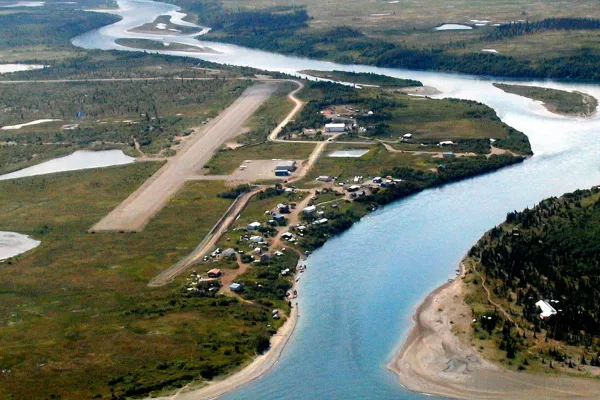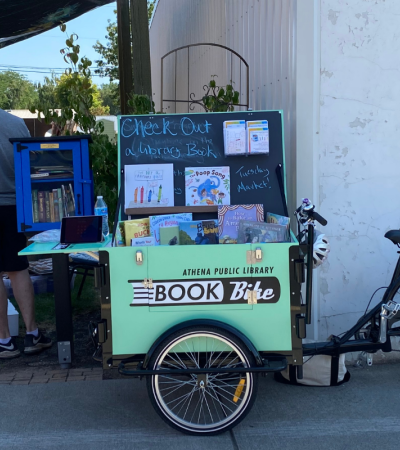Igiugig Village ("iggy-AH-gig") has a population of 70. Located in southwestern Alaska on the south bank of the mouth of the Kvichak River and Lake Iliamna, its population consists primarily of Yup’ik Alaska Natives. As a tiny and remote community of people who live close to the land, villagers rely on salmon as the main food source and have a passion for sustainability and clean energy.

Igiugig’s remote location makes access to things like internet and running water difficult. This remoteness creates a cost of living that is 80 percent higher than in Anchorage, creating a housing crisis that, due to slow government programs and Igiugig’s remote location, could take years to resolve. This is where the library steps in.
The Igiugig Tribal Library’s physical space is housed in the local school and provides the community with internet, resources, and, of course, books. In such a small community, the library is a hub for meeting, learning and staying connected. When the library was awarded a Libraries Transforming Communities: Focus on Small and Rural Libraries grant from ALA in late 2020, librarians Renae Zackar and A.J. Gooden were excited to use the grant’s resources to host conversations on the local housing issues.
I spoke with Renae and A.J. about their community conversations and learned more about how a tiny library in a tiny village can provide so much.
What is it like being librarians in Igiugig?
Renae: I have been the onsite librarian for a year and a resident of the village since I was 13 years old. We are both novice librarians, and our training has been entirely on the job.
A.J.: I was a schoolteacher in Igiugig before I started working at the library.
Renae: We share our physical space with the local school, and we are funded through the state library and IMLS. The library is slated to move into the old teacher housing once the new teacher housing is completed. Our space for a physical collection is limited, so we have been investing in digital materials. Right now, we rotate books in and out.
What’s great is that the school allows the library to use their internet during after-school hours. Many households here don’t have internet because it’s expensive and not fast. The internet at the school is the fastest in the village.
Why did you decide to host a conversation about housing at your library?
A.J.: We did a community survey to find out what topic people want to talk about. Of the people who responded, the number-one topic was housing and the housing shortage.
Renae: I am directly impacted by the lack of housing. I have five grown children. Two of them were living in a local rental without running water so they would come home to my place to shower and take water back in buckets to do their dishes. I own a small plot of land, but it’s just not big enough for my kids to build a house on.
Housing is a problem here for many reasons. It’s a political thing and goes back to how the land was allocated back in the 1970s. And with Igiugig being so remote, getting materials to build homes is a huge cost. I once bought lumber in Anchorage from Home Depot, and the cost of lumber is way less than the cost to ship it. I paid double to get it sent here.
Flying in materials is expensive too. We wait until the summer months, when there is no ice on the lake, to portage materials over.
The last round of housing made available was about 15 years ago. Now, 15 years later, my grown children are the ones that need housing. They are local to the land, and they would like to stay here. It’s a problem because if they don’t have an adequate place to live, they will have to move to Anchorage or somewhere else, but this is their home.
The village does a good job at pulling in grants and programs to employ its people, but there is a ceiling when it comes to how many people the governing entity can employ. It can be difficult to earn enough money to pay back loans for housing.
A.J.: We thought housing would be an easy topic to discuss, but we learned that it’s actually super complicated! We learned very early that this would have to be a series of discussions with our community. Our initial meeting went a bit different than what we planned for…
What happened at that first meeting?
Renae: In such a small community, everyone is very busy with their jobs and roles. They were supportive of us holding the meeting, but I think they were expecting to come out of the first meeting with a clear solution to the housing shortage.
The initial meeting ended up morphing into a storytelling session, which was, in itself, very helpful. We heard stories and experiences from those who have built or purchased homes to help younger generations. The next session will target people in the community who want housing and help them make an action plan.
Our young people are overwhelmed. Holding these conversations has taught us that they need resources and information to make it less of an overwhelming process. It’s become a bigger project for the library than just hosting conversations. I think we initially thought things would magically come to fruition, but this will require more time and networking with people in the area.
What do you have planned for future conversations on housing?
A.J.: Our upcoming meetings are designed to provide people with faster ways of securing housing. We are inviting different people to speak, such as a builder who will share designs for environmentally friendly tiny homes and information on the costs of getting materials from Anchorage to the village.
We will also bring in lending organizations to present what programs they might have to help people secure housing sooner than later.
As librarians, we have had to remind ourselves that it is not our job to secure the housing, but to facilitate the discussion on how that might be achieved. It’s going to take cooperation among the residents to advocate for themselves, and also the continued support of the local governing body, to make new housing become a reality.
Renae: Exactly. Our job was to open the space to have this conversation. Now we finally know what we need to do to help our community. We have this group with common goals, and that is a strong start. We are going to make a display to address the topic and make brochures available with information on housing to keep the conversation going.



